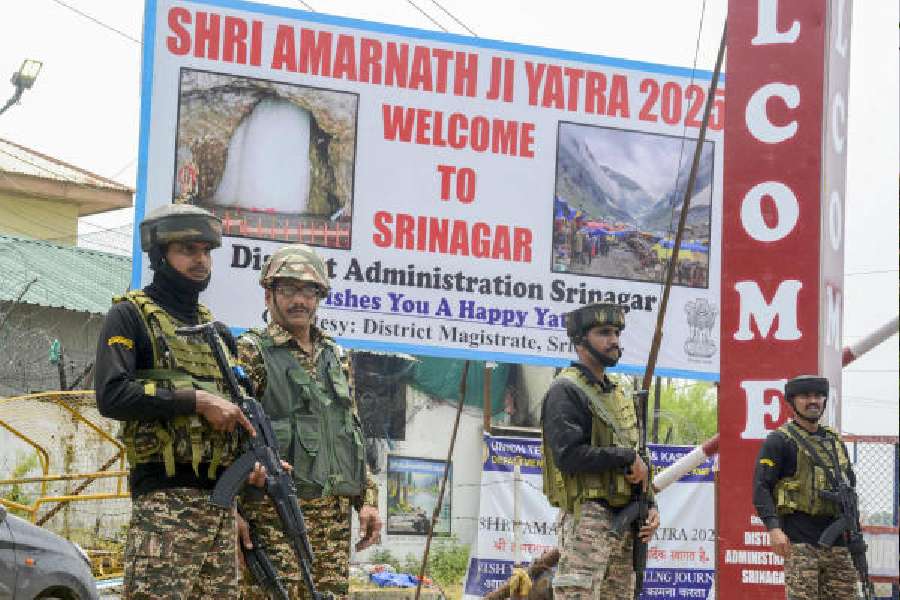 |
 |
Question: Has the investment climate in West Bengal improved? Answer: A resounding yes. Question: Would companies consider investing in West Bengal. Answer: The overwhelming majority won’t.
West Bengal’s Left Front government had better sit up ? companies are still leery of investing in the state.
That’s among the findings of a Telegraph-MODE survey of senior executives of 61 companies in four cities ? New Delhi, Mumbai, Hyderabad and Bangalore ? after the West Bengal bandh on September 29 but before the controversy about whether IT companies should be unionised raged in full bloom (See table). The corporations polled represent a wide swathe of industries, ranging from pharmaceuticals to IT, with their turnovers ranging from Rs 50 crore to over Rs 2,000 crore. Company CEOs, executive directors, vice-presidents and general managers were asked questions on issues that influence their investment decisions.
The survey’s findings fly in the face of common perceptions that industrial investments are poised to pour into West Bengal. Certainly, chief minister Buddhadeb Bhattacharjee’s aggressive moves to attract new industrial projects to West Bengal have attracted business attention. In a ringing endorsement of the government’s drive to attract investments, Sanjiv Goenka, vice-chairman of the RPG group, declares: “I am very satisfied with the government’s efforts to bring in investments. I have no hesitation in saying that Buddhadeb Bhattacharjee is the best chief minister in the country in terms of efficiency and performance. He has inspired confidence in the minds of investors.”
The state is regarded as a vastly better destination for doing business in than was the case many years ago. It has attracted not a few information technology (IT) companies (Wipro, for example; and Infosys has been in talks with the state government on establishing a presence in the state). What is more, the state government is expected to announce big-ticket investments in a few months.
Gopal Krishna ? managing director of the West Bengal Industrial Development Corporation (WBIDC), the state-government arm that oversees industrial investments ? says that projects in the pipeline include a Rs 2,000 crore cold-rolling mill which the Jindals propose to set up in east Midnapore, another Rs 1,000 crore investment by the Jindals in infrastructure at Haldia port to aid the export of steel and the import of raw materials for their 10-million-tonne steel plant in Jharkhand, an additional investment of Rs 4,500 crore by three companies, including the Haldia-based Mitsubishi, as part of their production capacity expansion plans, and perhaps even investments by Mukesh Ambani’s Reliance Industries.
But, as Ravi Poddar, chairman of the Confederation of Indian Industry (eastern region), points out: “The real estate, IT and IT-enabled services, retail and entertainment industries are doing well in terms of investments. But not much is happening on the manufacturing front.”
To be sure, an overwhelming 61 per cent of those polled agree that the general investment climate has improved in the state, with respondents in the IT hubs of Hyderabad (73 per cent) and Bangalore (71 per cent) being far more optimistic than those polled in Mumbai (35 per cent). Overall, only 36 per cent said that the situation hasn’t improved, with the rest either offering no comment or saying that they were uncertain. As Saroj Kumar Poddar, chairman of Gillette India and president elect of the Federation of Indian Chambers of Commerce and Industry, puts it: “The investment climate in the state has witnessed an upsurge over the last few years.”
Companies (66 per cent) also acknowledge that the work culture has improved in the state over the past few years, with 5 per cent of those surveyed even saying that it has improved a lot. Some 67 per cent of corporations polled also recognise that labour is cheaper in West Bengal than in other states. Last, but not least, all 61 of the companies polled said that the Buddhadeb Bhattacharjee government is investor friendly. Indeed, Saroj Poddar says that “investors are a lot more confident about Bengal”.
That’s jumping the gun. When the companies polled were asked whether they would invest in the state if invited by the state government or an industry association to do so, just 16 per cent replied that they would ? 44 per cent flatly said they wouldn’t; 38 per cent said that they were not sure whether they would. Sixty per cent of those polled in Hyderabad (where most respondents also said that the Buddhadeb Bhattacharjee government is investor friendly) that they wouldn’t invest in West Bengal; the figure for Delhi: 53 per cent.
So where lies the problem? Why is Corporate India not willing to put money in the state? For three reasons. First, more than half the companies (54 per cent overall and 76 per cent in Mumbai) surveyed say that they are worried by the bandhs in Bengal. Some 75 per cent say that bandhs are an impediment to the state’s progress on the industrial front. Secondly, 85 per cent of the companies agree that the Centre of Indian Trade Unions (CITU), the CPI(M) trade union, is an obstacle to industrialising West Bengal. Thirdly, the state’s poor infrastructure is a deterrent. Seventy per cent of the companies interviewed say Bengal’s infrastructure is in no way comparable with that of Maharashtra or Gujarat, the two states that bag the most domestic and foreign investments.
Some business executives back the point. Abhijit Sen, a former president of the Bengal Chamber of Commerce, says that though Bengal is said to be a power surplus state, it typically takes up to six months for companies to get an electricity connection. “In theory, there is power. But huge voltage fluctuations and frequent tripping in the districts damage the delicate machines manufacturers install these days,” he adds.
Exide Industries chairman S.B. Ganguly notes that much is happening in Calcutta because of the chief minister and his committed team but underlines the point that Bengal has a long way to go before it can catch up with the infrastructure of the more industrialised states. “You need better connectivity and it cannot just be roads. You need ports and telecommunications,” he says.
Having visiting Shanghai a few weeks ago, Sen also contends that Calcutta’s central business district could do with some sprucing up, the way Shanghai has been done up. The Bengal Chamber of Commerce has already submitted a proposal to the state government in this connection. “It’s known as the drawing room approach. If you cannot spruce up the entire house, at least spruce up the drawing room to make it attractive to visitors. Calcutta badly needs this,” he says.
Strikingly, 84 per cent of the companies polled feel that the government needs to “do far more” to draw investments to West Bengal ? only 15 per cent feel the government is “doing enough” to attract investment.
Asked to respond to the survey’s results, CITU general secretary and CPI(M) politburo member Chittabrata Majumdar riposted: “The survey is a refection of companies' medieval attitudes to workers. They are trying to reintroduce slavery by denying the workers their rights, but we won’t let them do that.” WBIDC managing director Gopal Krishna too argues that bandhs don’t influence investment decisions: “A company may not invest in Bengal for business reasons such as the non-availability of raw materials but it hardly gets deterred by the bandhs that happen once in a while.”
Meanwhile, the survey listed the biggest constraints on investments in West Bengal on the basis of five variables ? the availability of land, the power position, the state of the roads, the bureaucracy, the trade unions and the absence of political will ? and asked the respondents to rank them. The power situation ranked high, among many, as the biggest contraint, others underscored the bureaucracy and the trade unions together as the biggest problem.
For all this, however, some observers maintain that the Buddhadeb Bhattacharjee government has been wooing foreign investment in a bigger way than domestic investment. A case in point is its pursuit of Indonesia’s Salim group. Government ministers are now headed overseas in a bid for further investments. And even when it has been in talks with domestic companies, these have been the big boys of Indian industry, rather than the medium-sized corporations that make up the bulk of the respondents to the survey.
Nonetheless, the survey does hammer home one message that the state government would do well to heed ? it needs to do far more and go that extra mile which many in the industry now believe it isn’t doing. Unless it does so, the state’s industrial renaissance will lie in a very distant horizon ? Buddhadeb Bhattacharjee notwithstanding.










